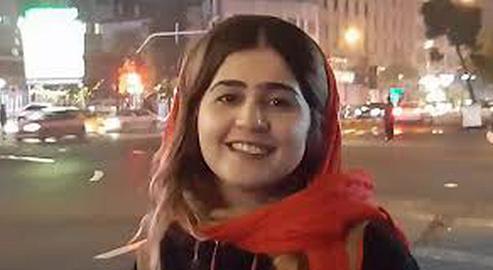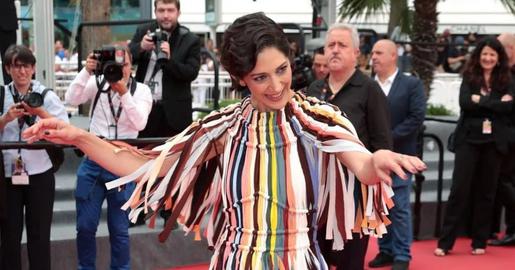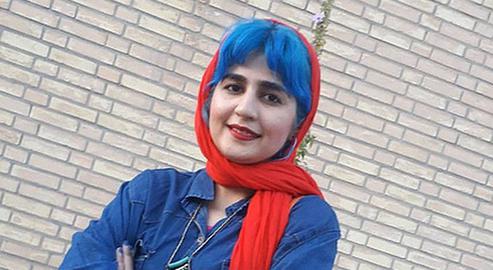Sepideh Gholian is a 25-year-old civil rights activist and journalist who was arrested during the labor protests of Haft Tappeh workers and sentenced to 18 years in prison. Her book, Tilapia Sucks the Blood of Hur al-Azim, tells the story of her detention at the Dezful Intelligence Detention Center and Sepidar Women's Prison in Ahvaz.
In these 19 stories, Gholian paints a meticulous picture of her horrific experience. On one hand, we directly encounter the face of oppression. On the other, we engage with the fates of others whose names, lives and imprisonment might otherwise be doomed to be forgotten and denied.
IranWire has previously published Gholian’s book in its original Persian and is now serialising the collection in English, while its author has been returned to Iran’s notorious Evin Prison. The stories are translated by Zahra Moravvej.
Torture is not limited to the narrow and ever-bright intelligence service cells. A female prisoner carries the heavy burden of torture within herself. But torture is a different story for Arab women, as though they are dissolved in it. She is bloody and frail; she hauls the torture with her through the corridors. Yet she is careful to cover her hair at all times. Even on her deathbed, she has a guilty conscience that someone might have seen her hair. So they grab her by the hair and drag her from one place of detention to the next, and from one prison to the next.
Now it’s worse than ever. They have been dragged in by their feet and seated in front of cameras. They have torn at her uterus, pulled on the fetus inside her, and bashed it several times. They have an excuse: "These are members of ISIS."
Being “a member of ISIS" is a new code that excuses suppression and torture. As if there is a sign on their foreheads, an armband on their arms. Hence, for them, being transferred to Sepidar becomes a never-ending nightmare.
"Look!” their label reads. “I am a member of ISIS." "Look! I am the assassin of your six-year-old children." Everyone including themselves has come to believe it. They have been forced to make televised confessions so many times that they too now believe they are "criminals" and "assassins". Somehow, they need to believe these accusations. Otherwise they won't survive in here.
When Sakineh Sagor was in labour, she began laughing for no reason. But since she returned to prison, she doesn’t laugh anymore. Is it postpartum depression? Does she have the right to be depressed? Her legs are injured. She could not open her legs to deliver, her baby and the doctors and nurses were yelling at her, "Do you want to give birth to another ISIS dog?"
Sakineh was anxious not only for herself but also for her daughter. She had to accept that little Fatima would be part of ISIS too: otherwise she wouldn’t survive. Nurses called her baby a “grenade”. Sakineh didn't take it very well. A day after her delivery she was returned to prison.
When she returned, she said: “Fatima is armed!"
Newborn Fatima, who doesn't even have a birth certificate, is labeled as "ISIS" too. What can they have done to her that she has returned so broken?
A few nights later, we are watching TV. Pirayesh yells: "Change the channel to the one I tell you."
We see the images. A confession! Onscreen we see Sakineh’s televised confession. She is confessing with a shredded uterus. And now Fatima has a birth certificate written in blood: "I am a member of ISIS."
There is chaos in the ward. The Arab women are punched and kicked.
Sahba is right. She says, “We are accustomed to torture."
Zahra says, “Take me to solitary."
Sakina gets purple feet and a bruised body.
Somayeh Hardini doesn't leave her bed. Maria is screaming and dancing barefoot in the middle of the corridor. Even Fatima knows that she has to be quiet at times like this, but not Maria.
It’s new year. And we force ourselves to be happy. Nisa has made foundation using moisturizer and cinnamon. Somayeh makes lipstick and we use a burned rubber band as eyeliner.
Nisa makes up her face, and they see it on the cameras. The higher authorities are informed and she is punished: banned from visitation, work, and calls. It’s two minutes into the new year and Nisa is already crying. Makieh takes her hand: “Don't cry. So, your calls have been cut. Once Arif was not home and I was baking bread, and his brother saw me wearing lipstick. He poured boiling water on my chest. These people are all the same." Nisa cries harder.
The next night, the duty officer announces: "Everyone watch channel one! It’s Damascus Time.”
“Damascus time?” Elahe asks me. “Are we in Syria?"
“It’s the name of the movie.”
The movie is about ISIS. Sahba and all others are being beaten again. Even baby Fatima was beaten. Two days later, Sahba is reprimanded; according to the prison head, “Sahba and Zahra were eating food while the movie was on. This is evidence that they are members of ISIS and should not be with each other."
Sahba is crying because of the never-ending interrogations. I go to brush my teeth. A very young pregnant woman is leaving the toilets. A flood took place in the city outside that has made our sewage system collapse; the corridor is filled with water and we have to be extra-careful to avoid slipping. The pregnant woman is carrying a tray and dishes in one hand, with the other on her big belly, walking carefully. We look into each other's eyes. She says: "He’s kicking. Our little son is kicking!"
Amid this torment and darkness, I, Elahe, Somayeh, Makieh, and the others have to celebrate these small, happy moments. We need to read poems and tell stories so we don't break.
When Ibrahim is born, the guards name him Ali. They force us to cling onto the happy moments, memorize the details and carry them with us to different cities and different prisons. We connect them with strings and paint the pictures of the young mothers on paper.
My son Ibrahim, who doesn't have a birth certificate. We will sing "Eyes, ears, nose and mouth" and draw your mother's face onto Khuzestan's bloodied body.
Now that the picture of your 19-year-old mother is drawn, Khuzestan will make the others understand the meaning of not being, of being invisible and faceless. Your mother is rather petite and has big hazel eyes.
I’ll tell everyone about what is happening here! I’ll talk about you, born in the warzone, the place of blood and goodbyes, Sepidar, and I’ll talk about how your name was changed to Ali. You take after your father. Your mother has an olive branch within herself, and wears black.
We have lost Elahe Darvishi. We lost her among the names. Her face will be painted in hopes of finding her.
She was strangely cute and rebellious. She loved painting and cooking. She was a rather short, white-skinned woman with big hazel eyes, who drew on the soil and breastfed her baby under bullets and rockets, and yet laughed loudly. She was forced to grow up a year when her Ibrahim, who was forced to be called Ali was born. She turned 19. While she was 18 she had paved the corridors of death with a child in her belly. She was the goddess who mourned for youth and life.
She fed her baby and laughed aloud. Her laugh was different from Sakineh's.
Sakineh’s front teeth protrude a little bit. Her laugh is carefree. Sakineh is 33 – and without a birth certificate, you know, Fatima is too. We depict Sakineh with her Arabic scarf: the same one they made her wear for the forced confession. They told her, “After we record this film, you can leave with your daughter.” Hence, after this film, Sakineh's laughter stopped forever. Hello, Sakineh, who wears an Arabic scarf and chador, carrying Fatima with a long, laugh-less face.
The last time I see her, she gives me a bite of Fatima's share of food: "Eat. You’re very young. You need to be strong."
visit the accountability section
In this section of Iran Wire, you can contact the officials and launch your campaign for various problems




















comments